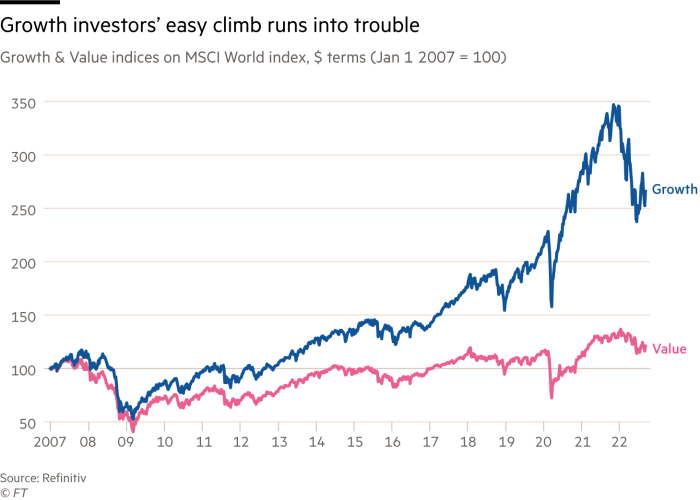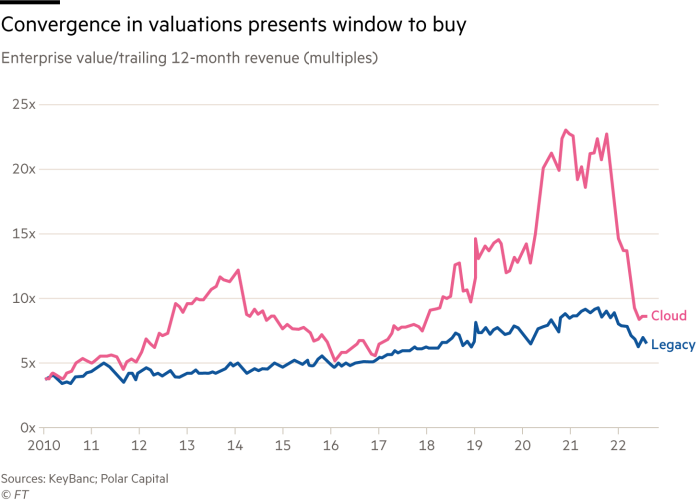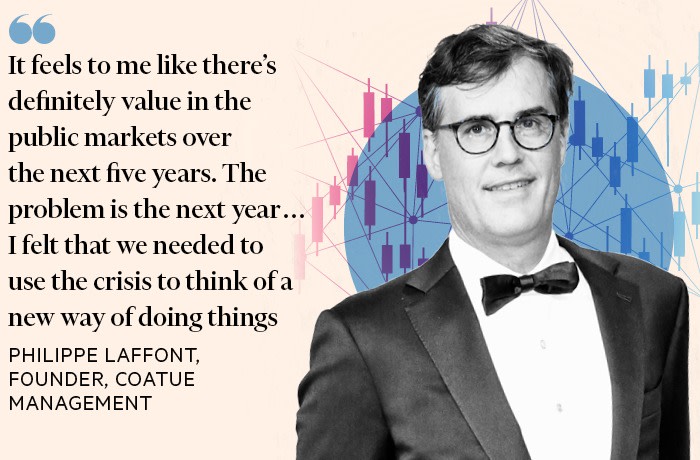[ad_1]
Growth investors are, by nature, optimistic. They believe we are living through a once-in-a-generation wave of technology-led change and that a small group of outlier companies can make exponential gains by shaping the future. The role of the successful investor is to identify these businesses.
It is an approach that in some cases has delivered spectacular returns over the past decade, as cheap money flooded economies and the prices of a string of tech companies soared.
But over the past year, the same investment philosophy has run into the buzzsaw of rising interest rates, inflation, war and the prospect of a looming recession. Many of these once high-flying names have been left nursing heavy losses, as tech stocks were sold off and the easing of lockdowns led so-called Covid-19 winners such as Zoom and Peloton to fall back to their pre-pandemic valuations. Investors have bought staid defensive names that have largely been overlooked by Wall Street for years.
In the US, T Rowe Price’s Global Technology Equity Fund is down 45 per cent in the year to date, the flagship hedge fund run by Chase Coleman’s Tiger Management lost 50 per cent through to the end of July, and Cathie Wood’s flagship exchange-traded fund Ark Innovation has dropped about 55 per cent this year to date. Ark Investment Management has lost almost half of its assets under management since December.
Among UK-based managers, Baillie Gifford’s FTSE 100-listed Scottish Mortgage Investment Trust is down 40 per cent this year to the end of August, while the Polar Capital Technology Trust has dropped 22 per cent through July. In Japan, plunging technology valuations and a weak yen drove Masayoshi Son’s conglomerate SoftBank into a record ¥3.1tn ($23bn) quarterly net loss in the second quarter.

Faced with such a humbling reversal, few prominent growth investors have abandoned their approach — and some believe the setbacks represent a cautious buying opportunity.
“Some great growth businesses appear to be on sale right now,” says Kirsty Gibson, an investment manager in US equities at the Edinburgh-based Baillie Gifford. “That makes now a really exciting time to be a long-term growth investor. It doesn’t mean that it’s a comfortable time, but it’s an exciting time.”
Ark’s losses do not appear to have dimmed its founder’s relentless confidence. “Innovation solves problems, and the world is facing many more problems today than two years ago,” Wood tweeted on September 8. “Innovation is key to real growth!”
But behind the outward bullishness about technological transformation, many growth investors have introduced significant changes to their strategies, placing a much greater focus on short-term profit potential and cash generation, and searching for new ways to support early-stage tech companies through a downturn.

“We’re not going back to the way things were,” says David Older, head of equities at the €33.2bn asset manager Carmignac. “Regardless of how high you think interest rates will go, this change from basically free money to cost of capital is going to have some ongoing negative effects for growth companies.”
Where is the cash?
Prominent growth investors say the macroeconomic environment has made them short-term cautious, but they still have faith that the technological revolution is only beginning.
Some funds employ a so-called “crossover” strategy of backing private companies as well as listed ones. Several growth investors emphasise their multiyear strategy to backing companies, which helps them ride out short-term market volatility. Tech stocks are seen as especially susceptible to rises in interest rates that diminish those potential future returns.
But rather than trying to second-guess where interest rates might go, they say they are doubling down on trying to understand whether the competitive landscape of their portfolio companies has altered. And they largely reckon the change in the macro landscape has not damaged the long-term potential of many of them.
Baltimore-based T Rowe Price’s approach is to imagine where a tech company might get to in three or five years’ time, and looks for those that can grow between 30 and 40 per cent a year. Five of the top 10 holdings in its global technology equity fund are in the software sector: Atlassian, MongoDB, HubSpot, ServiceNow and Snowflake Computing.
Julian Cook, a US portfolio specialist at the $1.39tn US asset manager, said that while rising interest rates hit tech company valuations, the more important question is “what does the fundamental performance of that business look like in terms of earnings growth, revenue growth and free cash flow growth” over a five-year period and within a high-interest rate environment.
But some other investors are giving short shrift to far-off promises of profitability. “We reduced the duration of the investments in our portfolio,” says Ben Rogoff, co-head of the global technology team at the £19bn asset manager Polar Capital in London. Half of his technology trust is invested in software and semiconductor names, among them Nvidia, TSMC and ASML Holding.
“You may well have the technology that’s going to address a very large market, you may well change the world,” Rogoff says. “But it’s really hard to have conviction about that right now.”
Investors are placing greater scrutiny on a company’s path to profitability, agrees Carmignac’s Older, who says timelines for returns have plummeted from 10 years to two. “It’s clear the market just isn’t going to finance open-ended growth stories anymore unless they can really prove out the economics of the business and generate cash flow quickly,” he adds.

Potential growth companies need to survive the present pressures — among them supply-chain disruption, inflation and tougher fundraising conditions — to make good on their long-term potential. Just as corporate executives are revisiting their business models, investors are trying to ascertain how their portfolio companies might cope in a downturn. In favour are cash-generative groups with market share, pricing power and less exposure to a decline in consumer spending — namely those they believe are more than just pandemic winners.
“A focus on resilience and adaptability of those businesses is even more important than it’s ever been,” says Baillie Gifford’s Gibson. The fund manager’s overall assets under management dropped to £231bn on June 30, a decrease of more than a third from 12 months earlier.
“Some companies will emerge stronger,” she adds. “We welcome the businesses who can cut fat — but we are cautious of businesses cutting muscle because we don’t want them to impair their long-term opportunity.”
The macro-driven sell-off in tech stocks has been indiscriminate, with the market not distinguishing between growth stocks with strong cash flow generation and those without. This is throwing up opportunities for investors to both selectively increase existing positions where a sell-off in the stock price has overshot a decrease in earnings, and to add new holdings.
Polar’s Rogoff says that there has been a convergence in valuations between next generation “software as a service” stocks and legacy internet companies, which provides a compelling chance for investors to snap up the former because of their higher growth potential.

Several investors say that they are bullish about defensive themes within tech such as high-quality semiconductor companies like ASML and Synopsys as well as cloud computing and enterprise software such as the database program MongoDB. When faced with inflation, enterprise software helps companies reduce costs, improve productivity and is typically a subscription model which is not cyclical.
Long-term structural trends are continuing, they argue. “The digitalisation of the economy and migration of work processes to the cloud are still happening,” says T Rowe’s Cook, adding that consumer-facing companies who over-earned during Covid were due a “get real” moment.
Growth bulls also say that the technological revolution has barely scratched the surface of huge swaths of the global economy, such as energy, gene sequencing and synthetic biology.
Baillie Gifford’s US team has added to its positions in software names like HashiCorp and Snowflake, as well as the education-tech company Duolingo and food delivery platform DoorDash.
‘The problem is next year’
Yet while some see the sell-off in growth stocks as an attractive entry point, not everyone is jumping in headfirst.
“It feels to me like there’s definitely value in the public markets over the next five years,” says Philippe Laffont, founder of the New York-based Coatue Management and one of the so-called Tiger cubs who trained at Julian Robertson’s Tiger Management. “The problem is the next year.”
Laffont is among the more bearish voices among the community of growth investors. Following the market sell-off earlier this year, Coatue liquidated positions in its hedge fund. In May, the hedge fund was sitting on more than 80 per cent cash, according to investors. This decision, and strong performance on the short side, helped its flagship hedge fund contain losses to down 17.6 per cent through August.

“The world is getting worse, not better,” says Laffont, rattling off the list of macroeconomic headwinds he worries about: no end in sight to the war in Ukraine; global energy and food crises; rising interest rates to combat soaring inflation; geopolitical tensions between the US and China, and between China and Taiwan.
Baillie Gifford, one of the biggest bulls on China in recent years, has warned of the mounting risks to foreign investors in China, both from future US sanctions and how the Chinese administration may try to limit the upside in stock prices for the breakthrough winners.

Other investors say that while some individual tech names look like good value, the market is not as cheap as it was in 2003, at the end of the dot-com bust, and 2009 — and caution that trying to call the bottom is a fool’s errand.
“I think there are some really good opportunities emerging but when the forward valuation of a software stock has gone from 25-times sales to 10-times sales, it’s really difficult to know if it’s going to stop at 10,” says Polar’s Rogoff. “If tomorrow war ended in Ukraine, we could say with some certainty that this would be the low, but the range of outcomes remains wide so we should tread carefully.”
Another dynamic giving would-be bulls pause is that while public markets have repriced, many investors have yet to publish writedowns on their private holdings. Baillie Gifford’s Scottish Mortgage gave one indication of what this might look like: the investment trust said that during the first half of this year, it performed 351 revaluations on the private companies in its portfolio and marked them down by 27.6 per cent on average.
A market pullback has made private investments relatively less attractive than their public counterparts, and increasingly picky venture capitalists are sitting on a record cash pile. Chase Coleman’s Tiger Global has not made a new private investment in more than a year, has dramatically cut its overall exposure to stocks and increased the prominence of its short book in its hedge fund, according to people close to the fund. SoftBank’s Son — who personified the expansive style of the tech boom — is also in “defensive mode”, piling up and retaining cash.
“Many of our most exciting opportunities are coming from the public markets because the sell-off has been so dramatic,” says Baillie Gifford’s Gibson. “The bar for inclusion for private companies for us is higher than it has ever been because the competition for capital is greater and you’re competing against a more depressed public part of the portfolio.”
A frothy market for tech valuations followed by a sharp sell-off inevitably prompts some market watchers to look for parallels with the dotcom boom and bust of the late 1990s. But investors said that while both timeframes included periods of irrational exuberance, the similarities were outweighed by differences.
“The technology sector itself is vastly more mature than it was in the late 1990s, the earnings numbers feel much more robust than they did at the time and there is a profoundly different valuation starting point,” says Polar’s Rogoff.
‘A new way of doing things’
In July Klarna, a Swedish company that pioneered the “buy now, pay later” business model, had its price tag slashed from $46bn to $6.7bn when it announced an $800mn fundraising round, sending ripples through the investor and start-up community. The drop in valuation at what was then Europe’s most valuable private tech company was one of the starkest signs of what many see as the trouble still to come in private markets.
With this in mind, some investors are trying alternative approaches. Coatue is raising $2bn for a structured equity strategy, the Tactical Solutions fund, which can lend money to cash-strapped private companies who do not want to raise dilutive equity financing at depressed valuations. Structured equity has debt and equity characteristics, and generally includes convertible debt, senior equity or debt plus warrants.
“I felt that we needed to use the crisis to think of a new way of doing things,” says Laffont. “Structured transactions are way for us to play offence and to provide a solution to founders during a downturn. We want them to continue to be able to grow their business, make attractive acquisitions and be able to expand their team. There are many new financing capabilities that can be used to support founders without them having to take huge markdowns.”
Atreides Management, set up by former Fidelity Investments portfolio manager Gavin Baker, is also raising money for an opportunistic venture fund. It will invest in structured equity transactions to take advantage of distressed situations in venture and it will also take public companies private, according to a July investor letter.
“It is easy to say, ‘Be fearful when others are greedy and greedy when others are fearful’, but much harder to do in practice,” wrote Baker, referring to Warren Buffett’s famous advice. “We believe the next 9-12 months will be one of the best times in history to be greedy and deploy capital within venture.”
[ad_2]
Source link

